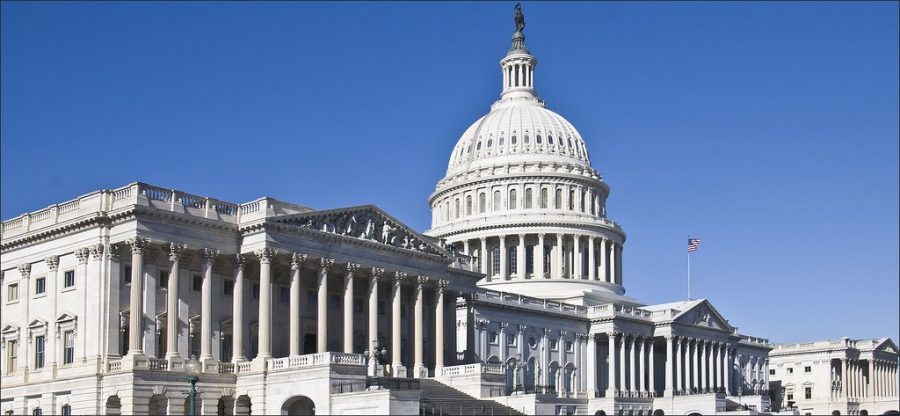House of Representatives approve new COVID funding
Ron Cogswell (Creative Commons)
“House of Representatives Building and the East Portico of the U.S. Capitol — Washington (DC) January 2013”
On Monday, Feb. 8, Rep. Alexandria Ocasio-Cortez and Senate Majority Leader Chuck Schumer announced a new Federal Emergency Management Agency fund of $2 billion. This fund will be used to grant families who have lost a loved one to COVID-19 up to $7,000 in reimbursements for funeral expenses.
To be eligible for funding, families must have incurred funeral costs between Jan. 20, 2020 and Dec. 31, 2020. While funds are currently not available for funerals that occured in 2021, Schumer says that he and Ocasio-Cortez are working to ensure that this funding will be extended until the end of the pandemic.
Guilford economics professor Bob Williams approves of this funding decision.
“Offering households who’ve lost family members to COVID-19 up to $7,000 in funeral expenses provides a targeted way that the government can help suffering families,” Williams said.
Hannah Preston, a political science and public health major, has a more personal perspective on this issue.
“As someone that’s lost a loved one during COVID-19, I know that $7,000 covers the cost for a casket,” she said. “I think that really puts into perspective the emotional, fiscal and financial burden placed on families during this pandemic and how overdue this support from the government is. This $7,000 is a first step for the US government to try and regain the American people‘s trust.”
This new bill is especially notable as previous lack of aid and difficulty passing stimulus packages has left many Americans feeling unsupported by the political system.
This funding hopes to address inequalities worsened by the pandemic. $260 million of this relief package is reserved to be directly allocated to low-income New Yorkers. The majority of this funding will likely go to neighborhoods in Queens, Staten Island and South Bronx that have been disproportionately affected by the virus.
Age, income and race have been key factors in the spread and impact of the virus, as COVID-19 has exacerbated already existing healthcare disparities. As Michael Schwirtz and Lindsey Rogers Cook of the New York Times reported, “Of the 10 ZIP codes (in New York) with the highest death rates, eight have populations that are predominantly black or Hispanic.”
“COVID has struck more deeply in the black, Latinx and indigenous communities as well as among the working poor, whose jobs do not permit working remotely,” said Williams. “This help will enable many of these grieving families to avoid the additional burden of falling deeper into debt, behind on mortgage payments or into bankruptcy.”
Alexandria Ocasio-Cortex also emphasized that these funds will be available for undocumented families. Preston was “happy to see undocumented families included in this decision.”
“During the last four years the federal government has turned a blind eye,” Preston explained. “Undocumented immigrants have worked through the pandemic in jobs that keep our country going. This decision not only validates that undocumented families need to be acknowledged, but hopefully sets a precedent for policies moving forward.”
This funding decision is a part of the second major COVID-19 stimulus bill passed in December that offers $900 billion in economic relief. The bill passed after much controversy within the House and Senate. Republicans pushed for a smaller bill and expressed concerns about the deficit, and Democrats pushed for further expansion and doubted that the spending would be enough to make a significant impact.
Despite concerns about the economic impact from both parties, Williams believes that this funding will have a positive effect on the economy.
“As the spread of vaccinations permits the return of safe gathering in public spaces, these funds will enable the economy to recover more quickly as more households have the means to support their local businesses and communities,” he said.









Frankie • Feb 22, 2021 at 1:40 pm
What about all the people that are on disability that have been hit by the virus food costs,ellectricity, and gas going up but not their pay checks. The average check for someone on disability 793 per month average rent 500 per month don’t leave very much.
Tracy • Feb 21, 2021 at 9:48 am
Mornings I was wondering how do I get this funding My grandfather died and this money could really help please thank you
Helen Lemons • Feb 21, 2021 at 1:22 am
I lost my daughter, my only child to COVID in May. Her life insurance had just expired on her job but we did not know. Had to borrow to pay for funeral expenses. She left 3 children that I now have. Two of the children tested positive, 1 hospitalized but survived. Does this Bill for assistance apply to my state, Tennessee? Please let me know. Thank you so much. Appreciate any and all help. Got behind in rent and utilities. Got eviction orders, etc. House we’re in is small for us but we are managing, thank God. Who could I contact?